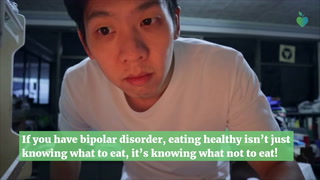Hypersexuality and Bipolar Disorder: When Impulsive Sexual Behavior Is Part of a Manic Episode

Bipolar disorder is a mood disorder in which a person experiences drastic mood swings — from feeling elated, energetic, and risky to feeling sad and disinterested. These mood swings, called episodes of mania and depression, are the classic signs of bipolar disorder.
When someone with bipolar disorder is having a manic episode, impulsive, reckless sexual behaviors and significantly increased sex drive are quite common. Such hypersexual behavior is often a warning sign of a manic episode.
5 Foods To Avoid If You Have Bipolar Disorder

Next up video playing in 10 seconds
What Exactly Is Hypersexuality?
It’s not unusual for people to experience a heightened sense of sexuality during a manic episode. And while an increased interest in sexuality on its own does not present a problem, when the heightened sense of sexuality is paired with the symptoms of bipolar mania — such as impulsivity, risk-taking, and poor judgment — the behavior can be destructive to many aspects of day-to-day life.
Experts aren’t sure why some people with bipolar disorder experience symptoms of hypersexuality and others do not.
“In general, hypersexuality is a symptom of hypomania or mania — it goes with that particular mood episode,” says Adele C. Viguera, MD, a psychiatrist at the Cleveland Clinic in Ohio. Mania is one of the two main episodes that someone with bipolar disorder may experience, while hypomania is a milder form of mania.
“Hypersexuality can be one of the characteristic symptoms of both,” says Dr. Viguera. Other symptoms may include:
- Excessive spending
- Not sleeping
- Being easily distracted
- Speaking quickly and in a scattered manner
Bipolar Disorder and an Increased Focus on Sex
While there isn’t a clear-cut definition or criteria for being hypersexual, for a person with bipolar disorder, it means being more focused on sex and risky sexual behaviors than the person normally is. What’s significant is the change or difference from the normal behavior.
People with bipolar disorder who are experiencing hypersexuality may:
- Have multiple sex partners
- Be inappropriately flirtatious
- Think about sex constantly
- Have one-night stands
- Be very interested in pornography
- Notice a difference in their sexual behaviors
- Engage in other reckless behaviors, like driving too fast or gambling
How Do You Treat Hypersexuality?
Hypersexuality with bipolar disorder isn’t a separate condition or problem that needs its own treatment — it’s a symptom of bipolar disorder. Once the condition is successfully treated and mood swings and symptoms are under control, those hypersexual feelings will dissipate.
“When bipolar disorder is not being treated effectively, hypersexuality is often a symptom that can wreak havoc in a person’s personal life and lead to poor decisions with possible serious and negative consequences. Treating the bipolar symptoms and getting hypomania and mania under control will often target and help hypersexuality as well,” explains Viguera.
“You treat the disease, not the symptom,” she adds. “Treatments usually involve medications such as mood stabilizers or antipsychotics, as well as psychotherapy such as cognitive-behavioral therapy or interpersonal social rhythm therapy,” she says.
Once the disease is under control, people with bipolar disorder often react differently to sex and their past behaviors.
“You often see a lot of regret for the past behavior, because they put themselves in very bad situations,” says Viguera. “When they’re well, they reflect on that, and there can be a lot of regret and remorse. It’s just another clue that shows you that it was not their normal state.”
In addition, hypersexuality can be one of the most difficult and challenging symptoms both for people living with the condition and for those close to them.
Sometimes the inability to control sexual urges leads to broken marriages and relationships. Both people in a relationship can suffer if these urges result in infidelity: The partner with bipolar disorder may feel distraught over having hurt the other partner, who in turn feels confused and angry for having been cheated on.
Bipolar Behavior, Hypersexuality, and Related Conditions
The study found substance abuse disorders to be quite common in people with bipolar disorder. The disorders with the highest prevalence in conjunction with bipolar disorder were alcohol use (42 percent), followed by cannabis use (20 percent) and other illicit drug use (17 percent).
Stimulants in particular can be problematic: The study authors point out that if stimulants (cocaine, amphetamines) are being used or abused, they could mimic symptoms of mania. In addition, alcohol and cannabis use can be linked to poor judgment, which may further contribute to hypersexual behavior.
Different Treatments for Bipolar Disorder
Bipolar disorder is usually treated with:
- Mood-stabilizing medications
- Antipsychotic medications
- Cognitive-behavioral therapy (in combination with medication)
- Other forms of therapy and counseling that may include family members
- Electroconvulsive therapy, which involves using small electrical waves to treat the brain
The right combination of these various therapies can reduce or eliminate bipolar mood changes between mania and depression, as well as prevent or reduce symptoms, including hypersexuality.
Those symptoms of hypersexuality may be a red flag for some people with bipolar disorder indicating that they are slipping into a manic episode. If a person with bipolar disorder starts to notice themselves thinking more about sex or engaging in promiscuous behavior, they should notify their doctor of this onset of symptoms.
Resources We Love
Depression and Bipolar Support Alliance (DBSA)
This organization supports people with depression and bipolar disorder. Learn more about treatment options for bipolar disorder, and check out the DBSA Wellness Toolbox.
A top U.S. hospital, Mayo Clinic has educational information about bipolar disorder on its website and also offers care for bipolar disorder at its four locations in the United States. Learn more about how to schedule an appointment.
National Institute of Mental Health (NIMH)
NIMH is a part of the National Institutes of Health, which is the world’s largest biomedical research agency. If you’re interested, consider participating in a research trial to help researchers discover more about potential treatments for bipolar disorder.
Additional reporting by Barbara Kean.

Heidi Green, MD
Medical Reviewer
In her private practice, Dr. Green provides psychiatric consultative services and offers an office-based buprenorphine maintenance program to support recovery from opioid addictions. She enjoys offering lifestyle medicine consultation to those interested in maximizing their emotional and physical health by replacing unhealthy behaviors with positive ones, such as eating healthfully, being physically active, managing stress, avoiding risky substance use, improving sleep, and improving the quality of their relationships.
At the opioid treatment programs, Green serves as medical director, working with a team of counselors, nurses, and other medical providers. The programs provide evidence-based treatment (including buprenorphine, methadone, and naltrexone) for persons suffering from opioid use disorders (such as addictions to heroin, fentanyl, or prescription pain medications).
Previously, Green has worked in community health and mental health settings where she provided consultation to behavioral health teams, integrated care teams, substance abuse intensive outpatient programs, and a women’s perinatal residential program. She also enjoyed supervising residents in her prior role as assistant consulting professor to the department of psychiatry at Duke University School of Medicine. During her training at the UNC department of psychiatry, she was honored to serve as chief resident, clinical instructor of psychiatry, and psychotherapy supervisor.
Green is passionate about the years we can add to our life and the life we can add to our years through lifestyle medicine! She focuses on maintaining her own healthy lifestyle through work-life balance, contemplative practices, and eating a plant-based diet. She finds joy through a continual growth mindset, shared quality time with her partner, and time spent outdoors backpacking and mountain biking.

Diana Rodriguez
Author
Diana Rodriguez is a full-time freelance writer with experience writing health-related news and feature stories. She is skilled in taking confusing doctor-speak and complex medical topics and crafting language that's easy for readers to understand. She is a managing editor at the Mayo Clinic and has written extensively for HealthDay. She lives in Louisville, Kentucky and holds a bachelor's degree in journalism and French from Miami University.
- Compulsive Sexual Behavior: Symptoms and Causes. Mayo Clinic.
- Hypersexuality and Couple Relationships in Bipolar Disorder: A Review. Journal of Affective Disorders.
- Prevalence of Comorbid Bipolar and Substance Use Disorders in Clinical Settings, 1990–2015: Systematic Review and Meta-Analysis. Journal of Affective Disorders.
- Compulsive Sexual Behavior: Symptoms and Causes. Mayo Clinic. April 19, 2023.
- Kopeykina I, Kim HJ, Khatun T, et al. Hypersexuality and Couple Relationships in Bipolar Disorder: A Review. Journal of Affective Disorders. May 2016.
- Hunt GE, Malhi GS, Cleary M, et al. Prevalence of Comorbid Bipolar and Substance Use Disorders in Clinical Settings, 1990–2015: Systematic Review and Meta-Analysis. Journal of Affective Disorders. December 2016.